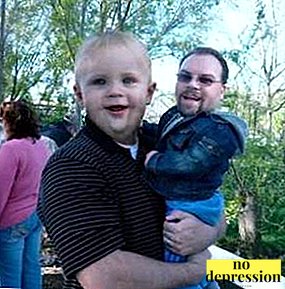Rigid personality type is often found in society and is subject to study psychologists.
There is a certain typology of rigidity and a method for determining the severity of a person of corresponding character traits.
What it is in psychology: the definition

Rigidity viewed from a psychological point of view as a partial or complete inability of the subject to change the program of their actions in accordance with the situation.
Often in people's lives, circumstances objectively add up so that there is a need to adapt to new conditions and change your usual style of thinking and behavior.
Rigid psyche does not allow a person to adapt to the situation.
The moderate expression of individual traits has a positive effect on the quality of life of an individual in society.
Rigid man - who is it?
Such people are very attached to stereotypes, for them it is a big problem to change their worldview. The reason lies in underdeveloped sensual sphere.
That is, their own feelings and experiences are of less importance than the experience gained by past generations.
A person is distinguished by pedantry, accuracy, responsibility, accuracy and logical thinking. is he rarely changes their habitsdiffers pronounced obstinacy.
Emotionally impressionable: important events and phenomena can change a state of mind for a long time. External stimuli are not able to have a significant impact on the values of such people.

They practically do not change under the influence of external circumstances or other people, demonstrate lack of ability to self-regulation and self-correction.
People with moderate rigidity are excellent workers in areas that do not require flexibility of thinking.
They are distinguished pedantry, thoroughness and diligence.
They always rely on their own experience and perform their duties clearly and accurately. Such people are very annoying and out of the rut of irresponsibility, superficiality and carelessness of others.
They are less susceptible to other members of society due to stress due to weakness of general trends and moods.
Similar mental stability promotes leadership: confidence in one’s position in life, ability to systematically move towards a goal, strict self-discipline, tendency to rivalry.
Typical features
The typical features of behavior, speech, thinking are revealed.
Behavior

In their daily life, rigid people demonstrate conservative behavior.
Suddenly changing environmental conditions cause rejection and stupor.
Chances of adaptation in extreme situations are quite low.
They always try until the last not to recognize the changes and do not change your usual style of behavior. The unwillingness to change does not affect the overall self-confidence.
Self-esteem and conceit such people always remain at a sufficiently high level, so that they are able to achieve a significant social status even in the absence of the necessary plasticity of the psyche.
Thinking
People of this psychological type have the following features of thinking:
- Stubbornness. Self-righteousness and inability to objectively perceive criticism directed at oneself.
A person always defends a personal point of view, considering it the only true one.
- Impressionability. Even insignificant events concerning significant aspects of life can cause a strong emotional experience. Experienced feelings can not be hidden from others.
- Persistence beliefs. The current system of moral attitudes, opinions and beliefs is not influenced from outside.
- Inability to show flexibility. The need to adapt to a changed situation often requires people to change their behavior, to abandon their plans. Rigid personalities, unlike plastic ones, cannot accept the fact of change and tune in to other circumstances.

Speech
Rigid speech is understood as monotony of words, frequent use of stamps and pauses. Sometimes this definition is applied to the slow speech of the interlocutor.
The reason may be in the characteristics of temperament, lack of vocabulary, unconsciously copying other people's conversations.
The peculiarity of speech may indicate an insufficient development of the intellect. In order to quickly and flexibly select suitable words during a conversation, you need to have a high level of intelligence.
Educated, well-read people always have an extensive vocabulary. They are able to pick up synonyms for words and adjust the style of conversation depending on the proposed circumstances (social circle, atmosphere, etc.).
Since the psyche of the individual has integrity, general rigidity of thinking and behavior can directly be reflected in speech.
Varieties
There are three main groups of rigidity:
- Cognitive. The desire to constantly adhere to the standard, developed patterns of behavior. Lack of ability to develop a new plan of action, taking into account the changed initial circumstances.
- Affective. The lack of relationship between the events and the severity of the emotional reaction to them. Affective rigidity is manifested in excessive concentration on objects, in supervaluable ideas.
- Motivational. Disruption of the motivation system. There is no desire to perceive new motives for the implementation of activities. Unwillingness to abandon the formed needs, their usual satisfaction.

Types of people
Psychologists distinguish several types of people who are distinguished by pronounced rigid behavior:
- «Flower ". A person demonstrates detachment from his social group. His contribution to the common cause is minimized.
This causes irritation among the group members, which negatively affects the mental state of the individual.
- "Jester". The cynicism and sharpness of judgments often have a negative impression on others. Making fun of other people or serious issues leads to problems in establishing contacts.
- "Warbler". Any unforeseen events cause discontent and annoyance. A person is constantly in a bad mood, which shows others. Constant complaints are annoying and “kill” any enthusiasm.
- "Conspirator". Does not pay attention to the needs of other members of their social group, adhering to personal convictions. There is a tendency to create isolated associations, which ultimately lead to the disintegration of stable groups.
- "Doubting Thomas". A skeptic who never believes in possible success. The rigidity of thinking does not extend to individual issues, but to the whole surrounding reality.

Advantages and disadvantages
Moderate severity such a mentality of mind is an exclusively positive aspect. Such people, as a rule, are quite sociable and self-confident.
They have an active life position, which helps to achieve a stable social position.
The social group demonstrates excellent organizational skills, dedication and responsibility. You can always rely on them.
Pronounced mental rigidity is a negative aspect that can hamper a person’s social existence.

Stubbornness, cynicism, extreme conservatism, unwillingness to adapt to the circumstances - all of these are negative traits of character, which have a negative impact on the ability to build contacts with other people.
And pathological conditionsin which there are mental disorders (paranoia, psychosis).
In this case, a person demonstrates excessive conflict, focus on their ideas, self-centeredness.
Measurement Method
The main method of identifying relevant features of character - psychological testing in the form of testing. Answers to specially selected questions in the test reveal the presence of standard features:
- preservation of sensation from any stimulus for a long time;
- problems with the change of habitual motor activity;
- long experience of events that are long gone;
- the inability to change the usual ways of achieving goals;
- intrusive representations.
It should be borne in mind that a person may be rigid in one manifestation and plastic in another.
Multidirectional test questions provide the necessary information. Identify the feature of the psyche can and as a result of interviews.

As a rule, people of a given psychological type enter into a conversation and slowly switch from one topic to another.
Their speech is different slowness and thoughtfulness.
They analyze the information and, in response, provide logical conclusions.
In response to questions posed are given. specific answers without distraction to extraneous moments.
Ways to overcome
If a similar psychological feature is expressed quite clearly and complicates contact with others, her need to be adjusted. The most effective way is to learn to concentrate solely on what is happening here and now.
At the moment of solving the current problem, it is necessary to completely discard the existing installations and past experience, try to assess the situation with a fresh look.
By learning to act in the current moment in time, you can gradually depart from the habit of relying on a stereotyping system.
It is important to understand that life experience and theoretical attitudes not always applicable to the proposed circumstances. The ability to adapt to the situation will allow you to more effectively interact with others and to get more benefits for yourself.
The clever thoughts of great people, the experience of previous generations, traditional formulas and methods give common knowledge, but developing your own strategy on the basis of this knowledge allows you to achieve significant heights.

You need to constantly think over the events that occurred in the present, and over their actions during these events.
Sober evaluation of mistakes made will allow to correct the behavior and in the future to choose a different strategy, more appropriate to the specific situation.
Thus, rigidity in its pure form is a negative feature of character, which can make life very difficult. The moderate expression of individual traits is a positive aspect.
A psychotherapist about rigidity in this video:



